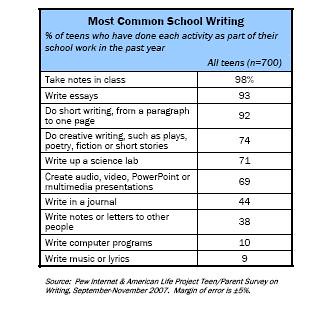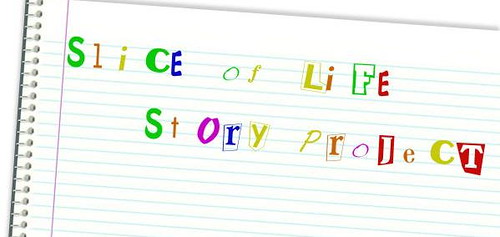A new report from the Pew Internet & American Life Project starts out with this:
“Teens write a lot, but they do not think of their emails, instant and text messages as writing. This disconnect matters because teens believe good writing is an essential skill for success and that more writing instruction at school would help them.”
The report is interesting and I need more time to digest it all. But certainly some trends seem to emerge from the data. The report indicates that teens are writing, and writing quite a bit, but their perception of whether that counts as “real writing” is low. Perhaps their writing in emails, on social networks and blogs, and in other technology-related projects is not being validated enough by adults because it falls outside the realm of traditionally-accepted practice.
One alarming trend is the perception by boys, in particular, that writing is not fun and not something that they are interested in. This gender gap correlates, too, with the fact that more girls than boys are using online platforms for writing, expression and communication. I see this in my classroom, for sure.
The Pew report also indicates that there seems to be both positive and negative connotations of how technology is affecting the writing habits of you people and what kinds of writing is being done in and out of school.
Check out these tables:




It is clear that writing is still a focus for teens (always a good sign) and that the imperative of educators is to use that desire to write in the classroom in meaningful ways. We need to use their interests in their authentic writing to guide them into instruction that we deem important and vital for them. There are ways to do this, but how many teachers are considering this? Not enough.
Yesterday, after the release of this report, I was contacted by a reporter from The Boston Globe for some comments on the Pew study. The reporter’s angle (there is always an angle) was that some findings in the report indicate that IM/Chat lingo is creeping into the classroom and into formal writing.
I certainly have seen that happen (and wrote a poem about it yesterday) but I explained that there is a balance between allowing young people to express themselves in a language that they can call their own and also reminding them of the expectations of formal conventions.
In my class, we talk about the English Language, and how it is a live entity and not dead on the page, and therefore, changes happen. The reporter seemed pretty much set against the idea that language shortcuts such as IM lingo are valid ways to communicate and that she was worried about the downfall of the English language as she knows it. So, I guess I will see how I am portrayed in the newspaper.
Check out the Pew report yourself and see what you think.
Peace (in writing habits),
Kevin


 The story begins with Jack stating outright that “Boys don’t write poetry. Girls do.” (That got a few laughs … from the boys)
The story begins with Jack stating outright that “Boys don’t write poetry. Girls do.” (That got a few laughs … from the boys)





